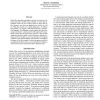Free Online Productivity Tools
i2Speak
i2Symbol
i2OCR
iTex2Img
iWeb2Print
iWeb2Shot
i2Type
iPdf2Split
iPdf2Merge
i2Bopomofo
i2Arabic
i2Style
i2Image
i2PDF
iLatex2Rtf
Sci2ools
AI
2011
Springer
2011
Springer
Relational preference rules for control
Much like relational probabilistic models, the need for relational preference models arises naturally in real-world applications where the set of object classes is fixed, but object instances vary from one application to another as well as within the run-time of a single application. To address this problem, we suggest a rule-based preference specification language. This language extends regular rule-based languages and leads to a much more flexible approach for specifying control rules for autonomous systems. It also extends standard generalized-additive value functions to handle a dynamic universe of objects: given any specific set of objects it induces a generalized-additive value function. Throughout the paper we use the example of a decision support system for command and control centers we are currently developing to motivate the need for such models and to illustrate them.
AI 2011 | Artificial Intelligence | Generalized-additive Value Function | Relational Preference Models | Rule-based Preference Specification |
Related Content
| Added | 12 May 2011 |
| Updated | 12 May 2011 |
| Type | Journal |
| Year | 2011 |
| Where | AI |
| Authors | Ronen I. Brafman |
Comments (0)

